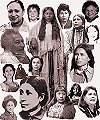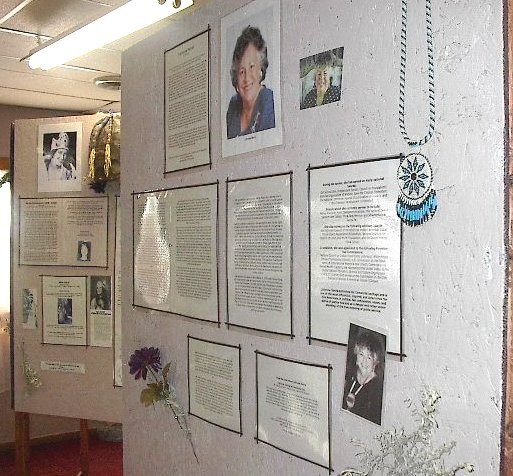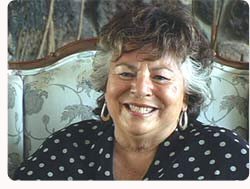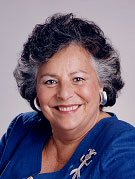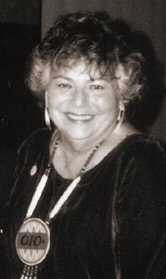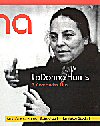LaDonna Harris
"I have to have the sun…feel the sky…space is like a gift of wealth…a sense of spirituality may be strictly a Comanche value." LaDonna Harris was born on a Comanche allotment in Temple, Oklahoma to a Comanche mother and Irish-American father. The couple split up soon after her birth. Raised in Indian country on a farm near the small town of Walters, Oklahoma during the Great Depression by her maternal grandparents (an Eagle Medicine Man and a devout Christian woman). Harris was educated in the customs of the tribe and so she modeled a life and career of mutual respect and personal choice and has an abiding belief that there is room for all traditions. Because she spoke only Comanche when she entered grade school and because of her unique upbringing, Harris views all things with the wisdom and values of two cultures. Harris has raised three children: Kathryn Harris Tijerina, the New Mexico Director for External Affairs for the University of Phoenix; Byron is a technician in television production in Los Angeles; and Laura is Executive Director at Americans for Indian Opportunity. Harris is especially proud of her teenage grandson, Sam Fred Goodhope who calls her by the Comanche word for grandmother, Kaqu .
Her partnership with Senator Harris made her a strong force in Congress where she was the first Senator's wife to testify before a Congressional committee. She was instrumental in the return of the Taos Blue Lake to the people of Taos Pueblo and to the Menominee Tribe in regaining their federal recognition. Her guiding influence on both pieces of legislation led to landmark laws that set a precedent that still guides Indian policy today. Gaining political momentum, she was able to work for the rights of Native Americans, children and the mentally ill. She served on a wide range of committees such as the National Rural Housing Conference and the National Association of Mental Health. In 1967, Harris was invited by Lyndon Johnson to chair the National Women's Advisory Council of the War on Poverty. She was also asked to join the National Council of Indian Opportunity, but once the Nixon administration was in place, her work seemed blocked by the bureaucracy of Washington. She resigned and in 1970 founded Americans for Indian Opportunity (AIO) a national multi-tribal organization that is still a catalyst for new concepts and opportunities for Indian peoples. This national organization works to enhance the cultural, social, political and economic self-sufficiency of tribes. and is devoted to developing the economic opportunities and resources of American Indians throughout the United States. The Harris's relocated to New Mexico in 1976 after former Senator Fred Harris made an unsuccessful bid for the Democratic candidacy for President. In 1980, as the Vice Presidential nominee on the Citizens Party ticket with Barry Commoner, Harris firmly added environmental issues to that and future presidential campaigns. Her influence now reaches to the international community to promote peace as well. LaDonna reestablished AIO in her new New Mexico home and she served as the Chief Executive Officer of AIO until 2002 when she passed the feather of leadership to Laura Harris (Comanche), the then Executive Vice President, and her daughter. Harris devotes time to a wide variety of interests including being a representative of the Inter-American Indigenous Institute and traveling around the world to study native populations on other continents. She was appointed to the U. S. Commission on the Observance of International Women's Year by President Gerald Ford. During the Carter years, Harris advised the Office for Economic Opportunity, and worked with the Council for Energy Resources Tribes, monitoring and advising tribes regarding the development of mineral and other natural resources on their lands.
In recent years, Harris expanded the AIO to meet current needs of Native American groups such as the "American Indian Ambassadors" program, which provides one-year fellowships for Native American students. Based on her past work with tribal governments and using traditional tribal values and perspectives as a foundation, this special Program is designed to empower a new generation of Native American leaders to meet the challenges of the 21st Century. The participants are instructed in tribal values and modes of government and sent to foreign countries where they can observe other indigenous governmental systems first hand. Harris believes… "In today's changing world, it is time for Native Americans to define ourselves…and what kind of new leaders we need for the 21st Century." This project is a fitting legacy to Harris' devotion to strengthening tribal governments and gives Tribal America a new cadre of leaders blessed by her spirit. Harris also founded some of today's leading national Indian organizations including the National Indian Housing Council, Council of Energy Resource Tribes, National Tribal Environmental Council, and National Indian Business Association. Harris has spent many years training the executive branch of the federal government regarding tribes'unique role in the U.S. Federal system. She has held hundreds of forums on the issues surrounding the intergovernmental interaction between tribes and federal agencies. She has published significant papers, including, To Govern or Be Governed: Indian Tribes at a Crossroads, Partnerships for the Protection of Tribal Environments, Indian Business Opportunities and the Defense Sector, Alternatives for Agriculture: Successful Tribal Farms, Hard Choices: Development of Non-Energy Non-Replenishable Resources, and Tribal Governments in the U.S. Federal System . In the 1980's, Harris was instrumental in the adoption of official Indian policies by the Environmental Protection Agency, the Department of Energy, and the Department of Agriculture. In helping tribes plan for the future, Harris recognizes the significance of the Information Age and the impact computer technology will have on tribal communities. She has created the first Indian owned and operated computer telecommunications network - INDIANnet -- dedicated to establishing and developing free public access to electronic information and communication services for Native Americans. The early 1990's, Vice President Gore recognized Harris as a leader in the area of telecommunications in his remarks at the White House Tribal Summit and then Secretary of Commerce Ron Brown appointed her to the Advisory Council on the National Information Infrastructure. Harris is a remarkable statesman and national leader who has enriched the lives of thousands. She has influenced the agendas of the civil rights, feminist, environmental and world peace movements. She was a founding member of Common Cause and the National Urban Coalition and is an ardent spokesperson against poverty and social injustice. As an advocate for women's rights, she was a founder of the National Women's Political Caucus. She was an original member of Global Tomorrow Coalition, the U.S. Representative to the OAS Inter-American Indigenous Institute, and currently serves on the board of Women for Meaningful Summits.has devoted her life to building coalitions that create change. She has been a consistent and ardent advocate on behalf of Tribal America. In addition, she continues her activism in the areas of civil rights, environmental protection, the women's movement and world peace. She was named U. S. Representative to the OAS Inter-American Indigenous Institute and the U. S. Representative to the United National Education, Science and Culture Organization (UNESCO). Boards which she currently serves on include: She also serves on the following advisory boards: In addition, she was appointed to the following Presidential Commissions:
LaDonna Harris embodies her Comanche heritage and is one of the most influential, inspired, and determined Native Americans in politics. Her compassion, vision, and sense of justice has lent us a deeper and richer understanding of the true meaning of public service. Read the book about LaDonna Harris
Credits for the writing on this page: |

Thanks ©Sparrow for this wonderful feather
Please click on any of the links below to journey around the museum. If you need to get back to the main page at any time just click on Sparrow's feather on any page and you will be transported home.
Exceptional Women Pages
Rest of the site
Ancient Tracks part of the Business
Museum Research & Curator
Gloria Hazell
Site created by Dragonfly Dezignz ©August, 2006
